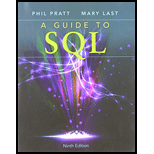
A Guide to SQL
9th Edition
ISBN: 9781111527273
Author: Philip J. Pratt
Publisher: Course Technology Ptr
expand_more
expand_more
format_list_bulleted
Concept explainers
Question
Chapter 5, Problem 13RQ
Program Plan Intro
JOIN ON Syntax:
The “JOIN ON” syntax is usually used to join two or more than two tables. This syntax usually works with “WHERE” clause. The keyword “JOIN” is normally placed between the table names in the SQL FROM clause. The keyword “ON” includes the matching key values.
Expert Solution & Answer
Want to see the full answer?
Check out a sample textbook solution
Students have asked these similar questions
2:21 m
Ο
21%
AlmaNet
WE ARE
HIRING
Experienced Freshers
Salesforce
Platform
Developer
APPLY NOW
SEND YOUR CV:
Email: hr.almanet@gmail.com
Contact: +91 6264643660
Visit: www.almanet.in
Locations: India, USA, UK, Vietnam
(Remote & Hybrid Options Available)
Provide a detailed explanation of the architecture on the diagram
hello please explain the architecture in the diagram below. thanks you
Chapter 5 Solutions
A Guide to SQL
Ch. 5 - Prob. 1RQCh. 5 - Prob. 2RQCh. 5 - Prob. 3RQCh. 5 - Prob. 4RQCh. 5 - Prob. 5RQCh. 5 - Prob. 6RQCh. 5 - Prob. 7RQCh. 5 - What does it mean for two tables to be union...Ch. 5 - Prob. 9RQCh. 5 - Prob. 10RQ
Ch. 5 - Prob. 11RQCh. 5 - Prob. 12RQCh. 5 - Prob. 13RQCh. 5 - Prob. 14RQCh. 5 - Prob. 15RQCh. 5 - Prob. 1TDCh. 5 - Prob. 2TDCh. 5 - Prob. 3TDCh. 5 - Prob. 4TDCh. 5 - Prob. 5TDCh. 5 - Prob. 6TDCh. 5 - Prob. 7TDCh. 5 - Prob. 8TDCh. 5 - Prob. 9TDCh. 5 - Prob. 10TDCh. 5 - Prob. 11TDCh. 5 - Prob. 12TDCh. 5 - Prob. 13TDCh. 5 - Prob. 14TDCh. 5 - Prob. 15TDCh. 5 - Prob. 16TDCh. 5 - Prob. 17TDCh. 5 - Prob. 18TDCh. 5 - Prob. 20TDCh. 5 - Prob. 21TDCh. 5 - Prob. 1CATCh. 5 - Prob. 2CATCh. 5 - Prob. 3CATCh. 5 - Prob. 4CATCh. 5 - Prob. 5CATCh. 5 - Prob. 6CATCh. 5 - Repeat Exercise 6, but this time use the EXISTS...Ch. 5 - Prob. 8CATCh. 5 - Prob. 9CATCh. 5 - Prob. 10CATCh. 5 - Prob. 11CATCh. 5 - Prob. 12CATCh. 5 - Prob. 13CATCh. 5 - Prob. 14CATCh. 5 - Prob. 15CATCh. 5 - Prob. 16CATCh. 5 - Prob. 17CATCh. 5 - Prob. 18CATCh. 5 - Prob. 1SCGCh. 5 - Prob. 2SCGCh. 5 - Prob. 3SCGCh. 5 - Prob. 4SCGCh. 5 - Repeat Exercise 4, but this time use the EXISTS...Ch. 5 - Prob. 6SCGCh. 5 - Prob. 7SCGCh. 5 - Prob. 8SCGCh. 5 - Prob. 9SCGCh. 5 - Prob. 10SCGCh. 5 - Prob. 11SCGCh. 5 - Prob. 12SCGCh. 5 - Prob. 13SCGCh. 5 - Prob. 14SCGCh. 5 - Prob. 15SCGCh. 5 - Prob. 16SCG
Knowledge Booster
Learn more about
Need a deep-dive on the concept behind this application? Look no further. Learn more about this topic, computer-science and related others by exploring similar questions and additional content below.Similar questions
- Complete the JavaScript function addPixels () to calculate the sum of pixelAmount and the given element's cssProperty value, and return the new "px" value. Ex: If helloElem's width is 150px, then calling addPixels (hello Elem, "width", 50) should return 150px + 50px = "200px". SHOW EXPECTED HTML JavaScript 1 function addPixels (element, cssProperty, pixelAmount) { 2 3 /* Your solution goes here *1 4 } 5 6 const helloElem = document.querySelector("# helloMessage"); 7 const newVal = addPixels (helloElem, "width", 50); 8 helloElem.style.setProperty("width", newVal); [arrow_forwardSolve in MATLABarrow_forwardHello please look at the attached picture. I need an detailed explanation of the architecturearrow_forward
- Information Security Risk and Vulnerability Assessment 1- Which TCP/IP protocol is used to convert the IP address to the Mac address? Explain 2-What popular switch feature allows you to create communication boundaries between systems connected to the switch3- what types of vulnerability directly related to the programmer of the software?4- Who ensures the entity implements appropriate security controls to protect an asset? Please do not use AI and add refrencearrow_forwardFind the voltage V0 across the 4K resistor using the mesh method or nodal analysis. Note: I have already simulated it and the value it should give is -1.714Varrow_forwardResolver por superposicionarrow_forward
- Describe three (3) Multiplexing techniques common for fiber optic linksarrow_forwardCould you help me to know features of the following concepts: - commercial CA - memory integrity - WMI filterarrow_forwardBriefly describe the issues involved in using ATM technology in Local Area Networksarrow_forward
- For this question you will perform two levels of quicksort on an array containing these numbers: 59 41 61 73 43 57 50 13 96 88 42 77 27 95 32 89 In the first blank, enter the array contents after the top level partition. In the second blank, enter the array contents after one more partition of the left-hand subarray resulting from the first partition. In the third blank, enter the array contents after one more partition of the right-hand subarray resulting from the first partition. Print the numbers with a single space between them. Use the algorithm we covered in class, in which the first element of the subarray is the partition value. Question 1 options: Blank # 1 Blank # 2 Blank # 3arrow_forward1. Transform the E-R diagram into a set of relations. Country_of Agent ID Agent H Holds Is_Reponsible_for Consignment Number $ Value May Contain Consignment Transports Container Destination Ф R Goes Off Container Number Size Vessel Voyage Registry Vessel ID Voyage_ID Tonnagearrow_forwardI want to solve 13.2 using matlab please helparrow_forward
arrow_back_ios
SEE MORE QUESTIONS
arrow_forward_ios
Recommended textbooks for you
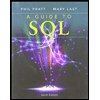 A Guide to SQLComputer ScienceISBN:9781111527273Author:Philip J. PrattPublisher:Course Technology Ptr
A Guide to SQLComputer ScienceISBN:9781111527273Author:Philip J. PrattPublisher:Course Technology Ptr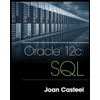
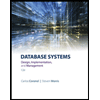 Database Systems: Design, Implementation, & Manag...Computer ScienceISBN:9781305627482Author:Carlos Coronel, Steven MorrisPublisher:Cengage Learning
Database Systems: Design, Implementation, & Manag...Computer ScienceISBN:9781305627482Author:Carlos Coronel, Steven MorrisPublisher:Cengage Learning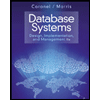 Database Systems: Design, Implementation, & Manag...Computer ScienceISBN:9781285196145Author:Steven, Steven Morris, Carlos Coronel, Carlos, Coronel, Carlos; Morris, Carlos Coronel and Steven Morris, Carlos Coronel; Steven Morris, Steven Morris; Carlos CoronelPublisher:Cengage Learning
Database Systems: Design, Implementation, & Manag...Computer ScienceISBN:9781285196145Author:Steven, Steven Morris, Carlos Coronel, Carlos, Coronel, Carlos; Morris, Carlos Coronel and Steven Morris, Carlos Coronel; Steven Morris, Steven Morris; Carlos CoronelPublisher:Cengage Learning

A Guide to SQL
Computer Science
ISBN:9781111527273
Author:Philip J. Pratt
Publisher:Course Technology Ptr



Database Systems: Design, Implementation, & Manag...
Computer Science
ISBN:9781305627482
Author:Carlos Coronel, Steven Morris
Publisher:Cengage Learning

Database Systems: Design, Implementation, & Manag...
Computer Science
ISBN:9781285196145
Author:Steven, Steven Morris, Carlos Coronel, Carlos, Coronel, Carlos; Morris, Carlos Coronel and Steven Morris, Carlos Coronel; Steven Morris, Steven Morris; Carlos Coronel
Publisher:Cengage Learning